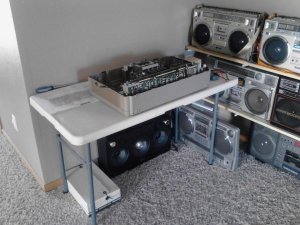That does indeed look like a signal tracer. However, note that it says right on the carton that it is "transistorized". I do not recommend that for any serious troubleshooting applications for all the reasons I mentioned above however.
For those wondering why these signal tracer testers back in the day all used vacumm tubes instead of transistors.... check out this comparo
http://www.effectrode.com/signal-tubes/vacuum-tubes-and-transistors-compared/
An ideal modern signal tracer would be one that incorporates operational amplifiers to produce the reproduced audio, automatic output level adjustment so the audio would always be at a comfortable listening level for you to discern the "quality" of the audio signal being tested (does it have hum or distortion?), and also include a gain level meter to show how much amplifier gain was necessary to produce the output result (so you can tell at a glance whether the signal amplitude being tested matches the expected output level for the circuit being tested). maybe I'll have to make one? A smart device using an arduino comes to mind.
maybe I'll have to make one? A smart device using an arduino comes to mind.
For those wondering why these signal tracer testers back in the day all used vacumm tubes instead of transistors.... check out this comparo
http://www.effectrode.com/signal-tubes/vacuum-tubes-and-transistors-compared/
An ideal modern signal tracer would be one that incorporates operational amplifiers to produce the reproduced audio, automatic output level adjustment so the audio would always be at a comfortable listening level for you to discern the "quality" of the audio signal being tested (does it have hum or distortion?), and also include a gain level meter to show how much amplifier gain was necessary to produce the output result (so you can tell at a glance whether the signal amplitude being tested matches the expected output level for the circuit being tested).
 maybe I'll have to make one? A smart device using an arduino comes to mind.
maybe I'll have to make one? A smart device using an arduino comes to mind.









